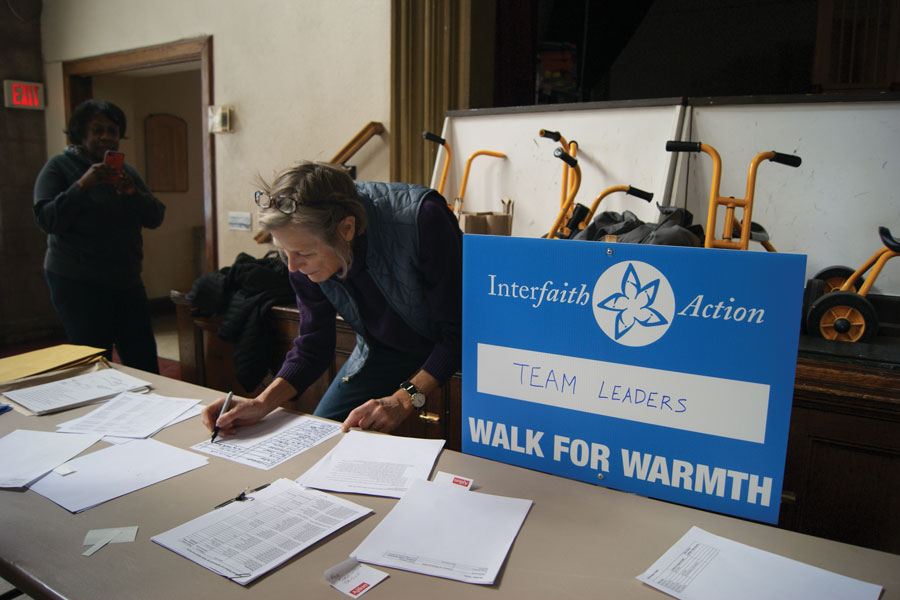Walk for Warmth raises $20k for overnight homeless shelters
Eva Herscowitz/The Daily Northwestern
Interfaith Action of Evanston volunteer Birch Burghardt checks in team leaders at the organization’s inaugural Walk for Warmth. Participants raised over $20,000 to maintain the six faith communities that host an overnight shelter from mid-November to mid-March.
January 20, 2020
Community members, religious leaders and local politicians raised over $20,000 for Interfaith Action of Evanston’s overnight emergency cold shelters at Monday’s inaugural Walk for Warmth.
Participants followed a roughly two-mile circuit, passing the five churches and one synagogue that take turns hosting the overnight shelter from mid-November to mid-March.
Walking with over 200 community members were Mayor Steve Hagerty; Rev. Michael Nabors, president of the Evanston/Northshore NAACP; fire chief Brian Scott; and several aldermen and religious leaders.
“I wanted to show my support for all my community members and the faith organizations that are working hard to help the homeless community,” Hagerty said. “It’s important that we all do our part, whether that is serving as volunteers in homeless shelters that we have, or financially supporting those organizations, or coming out here and bringing attention to the issue.”
Interfaith Action, a faith-based advocacy group, operates emergency cold shelters in six partnering faith communities: St. Paul’s Lutheran Church of Evanston, Unitarian Church of Evanston, First United Methodist Church, First Congregational Church of Evanston, First Presbyterian Church of Evanston and Beth Emet — The Free Synagogue.
Originally housed at St. Paul’s Lutheran and only open when temperatures fell below zero degrees, Interfaith Action’s cold shelter has progressively increased the temperature at which it starts accepting guests over the last 15 years.
This winter marks a major achievement for the group, director Sue Murphy said — it’s the first season the shelter has stayed open every night regardless of temperature, thanks to donations and increased volunteer participation. Money raised from donations and sponsorships at the walk will fund the upkeep of the six faith communities.
Participants first met at First United Methodist Church, where they assembled into around 20 teams, some representing faith communities and others headed by individuals. Interfaith Action president Anne Heinz and secretary Joey Rodger welcomed walkers, with Rodger reading part of Martin Luther King Jr.’s last sermon, “Remaining Awake Through a Great Revolution,” and then leading participants in a blessing.
Mildred Carter, who serves on Interfaith Action’s Direct Services Commission, said the organization chose to organize a walk due to its public nature. As participants passed by restaurants and local businesses, owners and customers stopped to cheer the group on.
“We decided to do a Walk for Warmth as a fundraiser to make persons who see us walking aware of the homeless population in Evanston, like what they face during the brutal winter,” Carter said. “I just love our missions of Interfaith, and that is to take care of our homeless and hungry. It’s so needed.”
Hagerty said Evanston contributes “tens of thousands of dollars” through city grants to Connections for the Homeless, which offers food, warm clothing and showers at its drop-in shelter and Hilda’s Place Transitional Shelter. He added that while the city is attempting to address homelessness, federal funding for social services program isn’t enough.
While the number of people affected by homelessness in Evanston is difficult to quantify, local nonprofit social service providers estimate about 10 percent of Evanston’s population — roughly 7,500 people — are either homeless or at risk of becoming so.
At the event’s end, participants and volunteers returned to First United Methodist Church. Heinz said ensuring the shelters can meet the demands of those they serve is crucial.
“Cold kills people, malnutrition kills people, homelessness ruins lives,” Heinz said. “By working together, we’re making Evanston a better community. The money we have raised for this event is critical in being able to carry out our mission.”
Email: [email protected]
Twitter: @herscowitz
Related Stories:
– Evanston organizations aid homeless during winter nights
– Housing and Homeless Commission looks for greater role in city decision-making, struggles to define role


